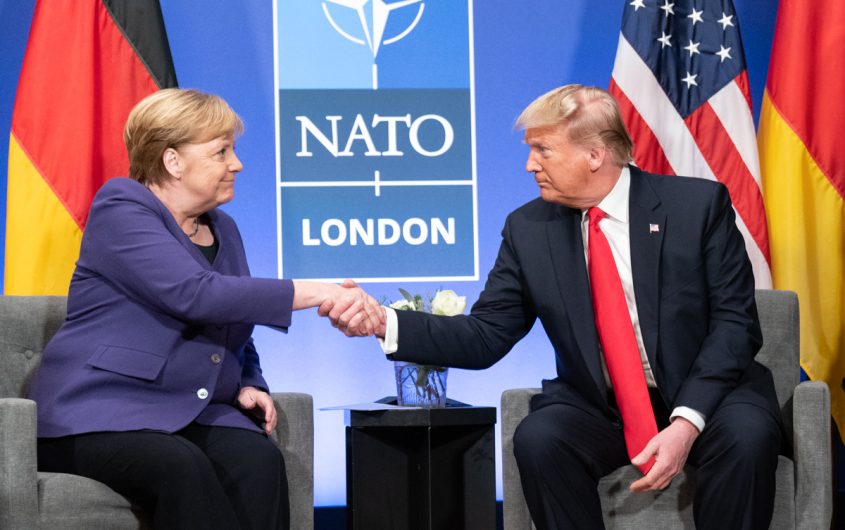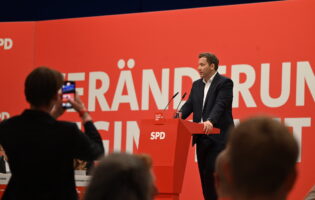
The White House via Flickr
The Foreign Policy Dimension of Germany’s Election Cycle

Liana Fix
Council on Foreign Relations
Liana Fix is a fellow for Europe at the Council on Foreign Relations (CFR). She is a historian and political scientist, with expertise in German and European foreign and security policy, European security, transatlantic relations, Russia, and Eastern Europe. She is also the author of A New German Power? Germany’s Role in European Russia Policy (Palgrave Macmillan, 2021). Dr. Fix’s work focuses on German domestic and foreign policy, the European Union, transatlantic relations, and Europe’s relations with Russia and China.
Prior to joining CFR, Dr. Fix was program director for international affairs at Körber-Stiftung in Berlin. She was also a resident fellow at the German Marshall Fund in Washington, DC, and a DAAD/AICGS fellow at the American Institute for Contemporary German Studies. From 2018 to 2019, she was a fellow for global governance futures at the Robert Bosch Foundation Multilateral Dialogues. From 2014 to 2016, Dr. Fix was a doctoral fellow at the German Institute for International and Security Affairs and associate fellow at the German Council on Foreign Relations. From 2012 to 2013, Dr. Fix worked as a Mercator fellow for international affairs at the German Federal Foreign Office, the EU Delegation in Tbilisi, and the Carnegie Moscow Center.
Dr. Fix has contributed essays, policy papers, and articles to peer-reviewed journals including Foreign Affairs, Foreign Policy, and the Washington Quarterly, among others. She is also a frequent contributor to international and German-language media.
Dr. Fix received her MSc in theory and history of international relations from the London School of Economics and Political Science and her PhD in political science from the Justus Liebig University Giessen. She is a member of the European Leadership Network Younger Generation Leaders Network on Euro-Atlantic Security and of Women in International Security.
The end of the era of Angela Merkel in German politics will reshape the German political landscape and promises the most open-ended parliamentary elections in September 2021 since the elections in 2005 – and all this against the backdrop of the COVID-19 pandemic. Which role will foreign policy play in German elections? How do the main parties position themselves on key foreign policy issues and to what degree does this positioning constrain or enable the options for a governing coalition? Lastly, on which foreign policy issues are we likely to see a lame-duck effect in the next months until the election?
Foreign Policy in German Elections
Traditionally, foreign policy plays a limited role in German elections, which are dominated by domestic issues. When the Social Democratic Party (SPD) attempted a pro-European election campaign in 2017, the result was disappointing. There are different explanations for the marginal role of foreign policy issues in German elections. Beyond the general argument about the limited importance for the everyday life of citizens and the difficulty to put complex issues into election slogans, some observers criticize a lack of vision and direction in German foreign policy. Only a concrete crisis situation – such as the opposition of Gerhard Schröder to the Iraq war – is actually beneficial in German election campaigns. Nevertheless, the general interest in foreign policy is high in Germany, and the increasing connections between domestic and foreign policy issues – particularly obvious during the pandemic – are a case in point for the need to address foreign policy issues more prominently than in the past.
The Priority List of the German Public
Which foreign policy issues matter most to the German public? Interestingly, the priorities of the German public are not entirely congruent with the priorities of the (national and international) foreign and security policy community. According to The Berlin Pulse public opinion surveys from 2017 to 2020, covering the last governmental term, the greatest challenges currently facing German foreign policy include the following priorities from the perspective of the German public: refugees and migration policy has topped the list throughout the last years, followed by relations with the United States and with Russia. Climate and environment are also priorities as well as different aspects of European policy, including the EU’s cohesion. Of course, the COVID-19 pandemic has appeared as a new priority in 2020. Interestingly, relations with Turkey and relations with China are among the least often mentioned priorities, which is particularly noteworthy when it comes to China. This priority list has seen deviations depending on the current news cycle but has remained stable overall throughout the last years.
China Not a Major Concern for the German Public
The perception of China as a key foreign policy issue on the transatlantic/U.S.-German agenda (see Merkel’s and Biden’s speeches at the Munich Security Conference 2021, which both featured China among the main foreign policy challenges) does not match the lack of awareness among the German public about China as a foreign policy challenge. The perception of China’s growing influence has shifted in the German public towards a more negative perception (43 percent of Germans see China’s growing influence as neutral, 46 percent negative, and 10 percent positive in 2020, compared to 51 percent neutral, 34 percent negative, and 13 percent positive in 2017). Overall, however, 82 percent of Germans argued in 2020 that Germany should remain neutral in case of a new U.S.-Chinese cold war. Furthermore, 63 percent of Germans do not see the United States as a partner in dealing with China, in contrast to 60 percent of U.S. respondents who do see Germany as a partner in dealing with China. In comparison, when asked the same question, 68 percent of UK respondents would stay neutral, and overall UK respondents have a much more negative perception of China’s influence than German respondents. This more critical stance also applies to U.S. respondents: According to the Pew Research Center, 59 percent of U.S. respondents consider it very or somewhat likely that the current U.S.-Chinese confrontation turns into a cold war, in contrast to 49 percent of Germans.
Key Foreign Policy Issues in the Election Campaign
Not all issues on the priority list of the German public are going to play a prominent role in the election campaign. Refugee and migration policy matters highly to the German public, but on this particular issue, there is little to gain in making it a campaign topic for the governing parties CDU/CSU and SPD. From the left, the grand coalition is criticized for contributing to an unbearable situation in the Mediterranean and for not standing up to problematic EU Frontex policies. From the right, the myth about “opening the borders” in 2015 still plays a prominent role in the discourse. Climate policy has gained renewed importance in the public debate after a verdict of the Federal Constitutional Court, which forces the government to toughen its climate goals. Although all major parties feature climate policy more prominently in their campaigns than ever before, the topic is primarily associated with the Green party and has contributed to their rise in opinion surveys.
Relations with the United States – especially if understood in the broader context of NATO, security and defense policy, and the German Bundeswehr – as well as relations with Russia, are likely to feature prominently in the election campaigns, as both have significant domestic implications. This touches upon the question of Germany’s NATO contribution (two percent debate), the equipment of the German army (armed drones), and the question of whether Germany should continue to remain part of NATO’s nuclear sharing or ask for a withdrawal of U.S. nuclear weapons from Germany and join the Treaty on the Prohibition of Nuclear Weapons. This debate also includes the replacement of the Tornado fighter jet fleet by 2030 until a new joint Franco-German fighter jet is ready for use. From a broader perspective, all these issues include the underlying question of how (in)dependent Germany and Europe should be(come) from the United States, especially in security and defense policy, even though the debate about European strategic autonomy is primarily limited to expert circles and not part of the public debate.
In the case of Russia, the obvious domestic link is the Nord Stream 2 pipeline, which has also been connected in public discourse to the case of Navalny and protests in Russia. Furthermore, the energy and climate dimension of Nord Stream 2 plays an important role, especially for Green voters. Although China policy is not a key concern for the German public, as mentioned above, it may nevertheless come up in election debates, given its relevance for the European and transatlantic agenda. This would include the issues of human rights, sanctions, Huawei, and trade relations with China.
Party Positions on Key Foreign Policy Issues
When it comes to relations with the United States, NATO, and security and defense, the CDU/CSU party, together with the Free Democratic Party (FDP), are the political parties most committed to NATO’s goal of two percent defense spending and to assuming greater military responsibility, for instance in the Indo-Pacific. CDU Defense Minister Annegret Kramp-Karrenbauer pledged to work towards the two percent goal. In a controversy with French president Macron, she called the idea that Europe could take care of its own security without the United States an illusion. The CDU/CSU is firmly committed to U.S. nuclear weapons in Germany and rebuked calls by their coalition partner, the Social Democrats, to think about a withdrawal of these weapons from Germany.
The Social Democratic Party (SPD) has moved under its new party leadership towards more left-leaning positions on security and defense. This includes the rejection of armed drones – although agreed upon within the Grand Coalition and supported by the party’s security and defense experts – as well as putting into question U.S. nuclear weapons in Germany and the two percent goal. In contrast, the Green party has moved towards the center on security and defense, compared to previous positions, which is interpreted by observers as preparation for becoming part of a governing coalition or even heading the government. Led primarily by chancellor candidate Annalena Baerbock, the Greens have adopted a more moderate tone on the role of NATO and European defense engagement, including European military missions. However, the left wing of the Green party remains rooted in pacifist policies. Criticism of NATO’s two percent goal and of U.S. nuclear weapons in Europe are mainstream Green party positions, and in their new program they call for Germany’s membership in the treaty on the prohibition of nuclear weapons, which would lead to Berlin’s withdrawal from nuclear sharing. On Russia and China, the Greens pursue a strongly value-based approach. They reject Nord Stream 2 and support sanctions on Russia, especially on human rights violations. Towards China, the Greens have adopted a critical stance over Hong Kong and the case of the Uighurs. This reflects a general focus on democracy and human rights in foreign policy, although the question remains how this normative approach can be sustained by capabilities.
Both governing parties, the CDU/CSU and the SPD, support the Nord Stream 2 project – a prominent issue especially for the SPD, given that former Chancellor Gerhard Schröder is chairman of the board of directors of the Nord Stream 2 project. While both parties signaled a willingness for compromise towards the United States on the issue of sanctions, they remain committed to the completion of the project. At the same time, both parties have supported a sanctions regime towards Russia since 2014. There are however nuances between the CDU/CSU and the SPD: Whereas parts of the SPD remain committed to the idea of a special relationship with Russia, connecting the idea to Willy Brandt’s Ostpolitik and détente policy, the CDU/CSU has become more skeptical towards a special relationship under the leadership of Angela Merkel. Nevertheless, both parties remain open to economic opportunities with Russia.
With regard to China, the CDU/CSU and the SPD have both begun framing China increasingly as not only an economic partner but as a rival and systemic challenge. The SPD has presented a parliamentary position paper on this issue. However, from the side of the Chancellery, relations with China – as demonstrated by the conclusion of the EU-China Comprehensive Agreement on Investment (CAI) – remain dominated by economic interests, as long as China is not perceived as a direct security risk. The idea of closer economic relations and integrating China into global structures remains prominent in both parties. When it comes to the question of infrastructure, a new German IT law sets hurdles for Huawei’s participation.
The political outsiders on relations with the United States, NATO, security and defense as well as relations with China and Russia are the Left Party and the right-wing Alternative for Germany (AfD). The Left Party has put into question Germany’s membership in NATO as well as deployments of the German Bundeswehr, even with a UN mandate. Towards Russia and China, the Left Party has been strongly criticized for turning a blind eye towards autocrats. Overall, the party is characterized by party infighting between the pragmatic and the fundamental wings. The right-wing Alternative for Germany (AfD) pursues an outright Russia-friendly but contradictory policy towards China. The AfD calls for increased defense spending but in the context of a more nationalist foreign policy. The AfD also demands in their program a referendum on the Euro – the original founding topic of the party.
Possible Coalition Options
When it comes to the question of how these foreign policy positions may constrain or enable future governing coalitions, it is important to keep in mind that governing coalitions will not be defined primarily by foreign policy, but by domestic policy issues. Nevertheless, there are certain combinations and coalition options that will be more difficult than others.
The most prominent coalition option with regard to current polling numbers is a “Black-Green” or “Green-Black” coalition between the CDU/CSU and the Green party or vice versa, possibly also with the Free Democratic Party (“Jamaica coalition,” which was already attempted but failed in 2017). Given the movement of the Greens towards the center on foreign policy issues, this coalition would not be without difficulties especially on Nord Stream 2, nuclear weapons withdrawal, and two percent, but it remains a realistic option. Clashes are also to be expected between the economic wing of the CDU/CSU and the climate-focused and value-driven foreign policy approach of the Greens.
Another potential coalition option would be a so-called “Green-Red-Red” coalition between the Greens, the SPD, and the Left party. Despite the convergence on some domestic issues, in foreign policy, this coalition would represent a complicated constellation. Especially since the Greens have moved towards the center on foreign and security policy, the outsider positions of the Left Party, in particular their soft stance towards Russia and China, would represent significant hurdles, which the SPD is unlikely to bridge. In general, the SPD views the Left Party as not mature enough on foreign policy issues. However, if it is the only option to come into power for all three parties, this constellation should not be entirely excluded, but would require significant compromises from the Left or the Greens and the SPD.
Lastly, a so-called “traffic light” coalition between the SPD, the Greens, and the FDP remains another possible option. As the FDP would likely enter such a coalition as the weakest partner, the more left-leaning positions of the SPD and the Greens would dominate and could result in a different approach in German foreign policy on some of the crucial issues mentioned above.
A Lame-Duck Effect on Foreign Policy?
To what extent are we likely to see a lame-duck effect in the next months on foreign policy? Although all main parties have expressed their commitment to work with the U.S. administration to re-strengthen the transatlantic relationship, Germany and Europe had a difficult start with the new administration on the issue of China and Nord Stream 2. Furthermore, on issues of security and defense, the Social Democratic Party is wary to lose more left-leaning voters and is unlikely to discuss topics such as armed drones or a stronger military presence. Far-reaching decisions on transatlantic policy or security and defense are therefore unlikely to take place within the grand coalition until the elections. In contrast, all parties have placed a stronger emphasis on climate policy, driven by the soaring poll ratings of the Green party. This is an opportunity to grasp from a transatlantic perspective – even if the COVID-19 pandemic and economic recovery will continue to play an outsized role in the election campaign.









